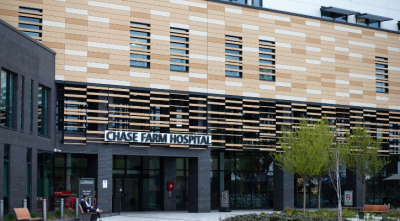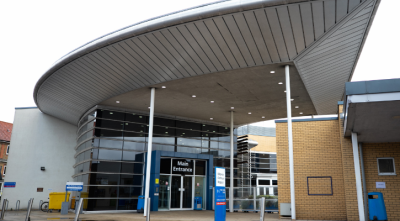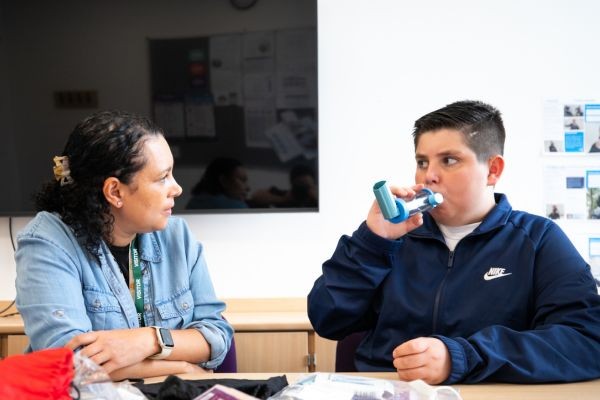At the Royal Free London, we diagnose and treat a range of lung conditions and breathing problems.
Your treatment will depend on the nature of the respiratory disease. For example, asthma treatment ranges from teaching patients to manage their condition, through to treating a severe asthma attack.
We also provide chronic obstructive pulmonary disease (COPD) treatment.
If your symptoms may be related to lung cancer, it is likely you will meet our specialist lung cancer nurse, who co-ordinates tests and care and provides support.
All cancer patients are discussed at a weekly meeting so the most appropriate lung cancer treatment can be recommended.
If you have or are suspected to have asthma that is more complex than might be managed by your own GP, or if you have been admitted to hospital as an emergency because of asthma, then you may be referred to the specialist asthma clinic. These take place at Barnet Hospital and Royal Free Hospital. You may be seen by a consultant, specialist registrar or respiratory clinical nurse specialist.
Most adult patients who are admitted to either hospital with an asthma attack are reviewed by the clinical nurse specialist (CNS) while in hospital.
Further tests that may be organised might include:
- lung function testing
- home monitoring of your peak flow rate (how fast you are able to blow out air into a measuring device)
- a measurement of airway inflammation known as FeNO, X-rays or CT scans, blood tests
- occasionally other tests as needed.
A small number of people with asthma have ‘severe asthma’ and may be seen by the severe asthma service based predominantly at the Royal Free Hospital. This may include review by specialist doctors, nurses, physiotherapist, pharmacist, voice therapist and health psychologist. There is a monthly severe asthma multidisciplinary team meeting across our hospitals where patients and the management of their care is discussed.
Biologic therapy
Biologic therapy with injectable medications may be an option for some people with severe asthma. These injections are given regularly (usually every 2, 4, or 8 weeks depending on the medication) and aim to reduce the number of asthma attacks as well as the amount of steroid tablets that are needed. These are centrally commissioned medications which are subject to additional regulations and patients being considered for these will be discussed in the multidisciplinary meeting. Your specialist will be able to discuss this with you at the time of your appointment.
The Royal Free London chronic obstructive pulmonary disease (COPD) team is made up of specialist doctors, nurses and physiotherapists,and works closely with local community services in Barnet and Camden to provide seamless care across the spectrum of COPD severity, from early disease through to those needing more advanced treatments such as assessment for endobronchial intervention, transplantation and non-invasive ventilation.
The Royal Free Hospital hosts the London alpha-1 antitrypsin deficiency service, providing multi-professional lung and liver care to people affected by alpha-1.
We have an international reputation for COPD research and an active research programme is embedded within the clinic.
Clinics for COPD patients in Barnet are community based and held weekly at Edgware Community Hospital and Finchley Memorial Hospital.
People living with bronchiectasis need access to appropriate diagnosis and management that is tailored to their individual needs, and this is the ethos of the bronchiectasis service at the Royal Free London.
We provide care for all types of bronchiectasis, with the exception of cystic fibrosis. We have a particular interest in bronchiectasis in people with immunodeficiency and run a joint respiratory-immunology clinic. We work as a multi-professional team, recognising the key role that respiratory physiotherapy plays in managing bronchiectasis.
We run a specialist bronchiectasis service (based at the Royal Free site), caring for patients with a wide range of underlying causes for their lung disease. We work closely with a number of other medical teams (including immunology, rheumatology, gastroenterology, renal transplant, infectious diseases and microbiology) and allied health professionals (physiotherapy, pharmacy) to provide holistic care for our patients. We treat patients with a wide range of respiratory infections including pseudomonas, fungal lung disease and non- tuberculous mycobacteria.
There is a weekly specialist bronchiectasis clinic and a monthly joint clinic with immunology. There is a weekly physiotherapy clinic providing support for airway clearance for our patient population.
We also have a respiratory infection MDT once a month where we discuss patients who have a higher complexity and have time to review the case with specialist colleagues.
We work closely with pharmacy and infectious disease/ microbiology colleagues to use the outpatient intravenous antibiotic pathway where possible to avoid hospital admissions where not necessary for the patient. We also have a nebulised antibiotic pathway with standard operating procedures for nebulised antibiotics and hypertonic saline.
We have good links with colleagues at the Royal Brompton Hospital where we refer some patients for further review and diagnostics including full cystic fibrosis and ciliary testing.
Bronchoscopy is telescopic examination of the lungs. We use state-of-the-art equipment to perform diagnostic bronchoscopy and endobronchial ultrasound (EBUS) for the investigation of suspected lung cancers, haemoptysis (coughing blood), pulmonary infections (including tuberculosis), sarcoid and ILD.
Bronchoscopy is performed as a day-case procedure for outpatients. This means you go home from hospital the same day as the examination.
Bronchoscopy is performed with local anaesthetic to the airways and often an intravenous sedative.
|
Interstitial Lung Disease (ILD) is a term used for a group of disorders that affect the tissue of the lung as opposed to the airways. Some are acute illnesses, but most are chronic diseases that result in lung scarring (fibrosis).
It is important to get an accurate diagnosis.
The ILD service at the Royal Free London is located at Barnet Hospital and has expertise in the specialist management of a wide range of these interstitial lung diseases, including:
We offer the opportunity to participate in national and international research studies and have dedicated specialist respiratory nurse involvement and support.
We have links with tertiary ILD centres at University College London, and Royal Brompton Hospital, who are nationally commissioned prescribing centres for antifibrotic medications. ClinicsClinics run all day Tuesday and on Wednesday afternoons at Barnet Hospital. ReferralsGPs can refer patients to this service using eRS. Contact usEmail: ild. Helpful online resources |
Lung function refers to how well a person's lungs and respiratory system are working.
We use lung function tests to assess diagnose breathing problems, such as shortness of breath.
Lung function test
We might ask to you to take a lung function test if you are suffering from shortness of breath.
Doctors can use the results of these tests to determine whether your lungs are functioning optimally and within the limits expected and to help diagnose conditions such as asthma, pulmonary fibrosis (scarring of the lung tissue), and COPD (chronic obstructive pulmonary disease).
Specialist tests
We also provide several specialist tests. These include:
- hypoxic challenge testing (also known as a “fitness to fly” assessment)
- skin allergen testing
- six-minute walk test
- bronchial challenge testing
- sleep studies
Additional specialist tests are performed at the Royal Free Hospital. These include:
- airways resistance using plethysmography
- capillary ear lobe blood gases including long term oxygen (LTOT) assessments
- mouth and nasal pressures to measure the strength of the respiratory muscles
- anatomical shunts
- overnight transcutaneous carbon dioxide (tcCO2) monitoring
The pleura are membranes lining the inside of the chest wall and the outside of the lung. Pleural disease can lead to excess fluid (pleural effusion) or air (pneumothorax) in the chest cavity.
The pleural disease service at Royal Free Hospital and Barnet Hospital provides care for patients with pleural disease. Outpatient pleural procedure clinics take place at both hospitals.
The range of procedures includes:
- Thoracic ultrasound
- Pleural aspiration
- Intercostal drain insertion
- Indwelling pleural catheter management
- Talc pleurodesis
- Ultrasound guided biopsies (of the pleura, lung, and lymph nodes)
- CT guided biopsies
We work closely with the thoracic surgery teams at Royal Brompton Hospital and University College London Hospitals.
Links
Our sleep and ventilation team see, diagnose, and treat people who have problems with their sleep and in particular people who have trouble with their breathing when they are sleeping.
We look after patients with long-term breathing problems who may need assistance with their breathing overnight, including:
- chronic obstructive pulmonary disease
- scoliosis
- neuromuscular disorders
- motor neurone disease
- respiratory failure due to obesity such as obesity hypoventilation syndrome
Continuous positive airway pressure (CPAP) is a machine used to treat obstructive sleep apnoea (OSA).
The treatment works by blowing air into the upper airways, providing a small amount of pressure during sleep, to keep the upper airways open and stop them from closing.
Some patients benefit from using a type of breathing machine called a non-invasive ventilator (NIV).
People using NIV need to wear a cushioned mask that either fits over their nose alone, or over both their nose and mouth. A strap holds the mask firmly in place, but it can easily be removed.
Some patients, especially those with neuromuscular conditions such as motor neurone disease, will have difficulty coughing and getting rid of their phlegm.
Making phlegm is a normal part of the way our lungs work, but when we cannot get rid of the phlegm it causes problems, such as chest infections.
We can offer a specialist physiotherapy assessment to help you cough up your phlegm.
We use Actiwatch devices, which are wrist-worn activity data recorders that look like a watch and record data relevant to your sleep and activity levels, and light levels.
The Actiwatch tells us information about your activity levels, sleep schedules, naps, wake episode and sleep quality and quantity.
We use actigraphy as part of our assessments and we use the information to help us decide a diagnosis.
If you have been issued with a Philips Respironics RemStar auto or Dreamstation CPAP machine, it will work with DreamMapper.
DreamMapper is an app which works with your CPAP machine to tell you information about how much you have used your machine and how well it is working.
Stop Smoking
Stopping smoking is one of the best things you can do for your health. We understand that stopping smoking can be difficult, but the sooner you quit, the sooner you will notice changes to your physical and mental health.
Stop smoking support available
With support from stop smoking specialist and medication, most people find it easier to stop than if they tried on their own. There are lots of options to choose from, such as medications (nicotine replacement therapy (NRT)), self-help materials, your local pharmacy or GP and community stop smoking services (who offer support and advice on the best ways to quit and help with NRT).
Support for inpatients
When you are admitted to one of our hospitals you should be:
- Asked if you smoke.
- Be given advice on harmful effects of smoking and offered help to stop smoking.
- Prescribed medication to help you stop smoking.
- Referral to a stop smoking specialist in the hospital for extra support if you consent.
- Referral to the community stop smoking team to support you with your ongoing quit attempt if you consent.
Royal Free London healthy living hub (HLH)
The healthy living hub supports patients make healthier lifestyle choices through smoking cessation, healthy eating, physical activity, and reducing alcohol intake. Our advisers can support patients to stop smoking and signpost to community stop smoking services.
If you want to find out more about the Healthy Living Hub, then email rf-tr.
Support for outpatients
At your appointment, you should be:
- Asked if you smoke.
- Be given advice on harmful effects of smoking and offered help to stop smoking.
- Offered referral to a local stop smoking service.
You can also ask your clinician to refer you to your local stop smoking service and prescribe you medication. NRT products are also available to buy over the counter from all pharmacies including across RFL hospital sites, or you can ask your GP to prescribe this.
Community stop smoking services
You are three times more likely to quit with the help of your local stop smoking service, there is a variety of effective support available, for more information:
National SmokeFree Helpline
Tel: 0300 123 1044 (England only).
Stop Smoking London
Visit their website or telephone: 0300 123 1044.
BetterHealth
Download the free NHS quit smoking app.
Local Smoking Cessation Services
These services provide free support to help you stop smoking. Service provision may vary for each London borough.
Follow the links below to each of the borough websites.
The following websites have information and support you may find useful:
Urgent respiratory referrals
You will be urgently referred because your GP feels your symptoms need further investigation.
There are many common conditions that these symptoms could be linked to, including the possibility of cancer.
Because your referral is urgent, you will be offered an appointment within two weeks.
Cancer
Having an urgent referral does not mean you have cancer. However, you have been referred because you need to see a specialist or have some investigations quickly to help find out what is wrong with you.
If our investigations determine you do have cancer, early diagnosis means treatment is likely to be more effective and this is why it is important you are seen within two weeks of the referral being made.
Your appointment
You will be contacted by phone to arrange an appointment and some investigations before being seen in the clinic. This may be offered at short notice (the following day) or at any time within the next two weeks.
Should you choose not to attend the clinic please call 020 7794 0500 ext 23331. This enables us to use the urgent appointment for somebody else.
This appointment has been arranged to find out the cause of the problems you are having with your chest. You may like to bring a friend or relative with you for company.
Results timeline
The full medical history and physical examination may give your doctor enough information to discuss the findings with you by the end of this first visit. Sometimes, your doctor may wish to have the results of the CT scan before telling you exactly what is wrong.
Once you have had your investigations, you may be given another appointment to come back to see the doctor to discuss the results and any treatment that may be necessary.
Sometimes, your doctor will write to you and your GP about the result when no further appointment is required.
 Translate
Translate





